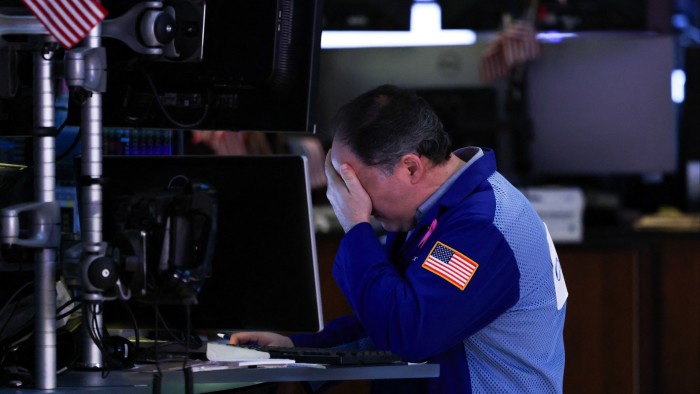Stay informed with free updates
Simply sign up to the US equities myFT Digest — delivered directly to your inbox.
Tech stocks led a Wall Street sell-off on Wednesday after chipmaker Nvidia revealed that new US controls on sales to China would wipe billions of dollars from its earnings, dragging its peers sharply lower in early trading.
The Philadelphia Semiconductor Index lost 3.7 per cent, taking its loss for the year to more than 22 per cent. All 30 of its constituent stocks fell.
Nvidia was hardest hit, down 7.4 per cent, after it said in a filing late on Tuesday that the Trump administration’s plans to clamp down on the company’s sales of its H20 chip to China would dent earnings by about $5.5bn.
Wednesday’s declines for chipmakers pulled the tech-heavy Nasdaq Composite 2 per cent lower, while the blue-chip S&P 500 lost 1.2 per cent.
Bank of America strategists said semiconductor shares were falling because “rising AI restrictions” were likely to impact related stocks including Broadcom, Advanced Micro Devices and Arm.
Tech stocks, which were fresh from a more than two-year rally at the start of this year, have been hit particularly hard by Donald Trump’s aggressive tariff policies, which earlier this month included steep “reciprocal” levies on all major US trading partners.
The measures have fanned concerns about slowing economic growth and sparked a wave of selling of dollar-denominated assets.
The Nasdaq entered bear market territory in early April, marking a decline of more than 20 per cent from its mid-February high. But it subsequently rebounded when the White House announced a 90-day pause to the “reciprocal” tariffs, with the exception of those on China.
Tech stocks had climbed further on Monday after the White House said smartphones and other consumer electronics would be excluded from the additional duties, though officials said they could later be subject to tariffs on semiconductors.

In currency markets, the dollar fell sharply against a basket of six peers, taking its decline this year to more than 8 per cent.
Yields on US 10-Year Treasuries were flat on Wednesday, as were the prices of large exchange traded funds that hold high-grade and risky corporate credit.
Gold prices climbed more than 3 per cent to a fresh record high of $3,332 a troy ounce.
The stock market declines come as the World Trade Organization warned on Wednesday that Trump’s tariffs could drag the world into a recession, with global output at risk of falling as much as 7 per cent.
US retail sales data released on the same day showed a bigger-than-expected 1.4 per cent increase in March.
But Bill Adams, chief economist for Comerica Bank, attributed the rise to “panic buying” as “consumers rushed to buy goods before tariffs pushed prices up”.
Adams said he expected lower consumer confidence to weigh on spending in the near future, with businesses more likely to hold off on hiring as they wait for more clarity on tariffs.
https://www.ft.com/content/0e18bb8e-30cd-448d-99cb-98b266753391


